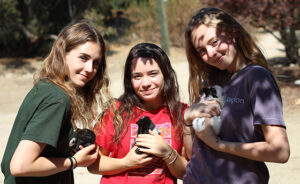 I almost didn’t recognize 10-year old Eli as he stood in front of our entire 4th – 10th grade camp community leading a rousing morning cheer on his last full day at Kibbutz Bob Waldorf. He seemed fueled by an enormous dose of self-confidence, social leadership, and pure joy. Was this the same camper who spent time each previous day, eyes wet with tears, as he grappled with intense feelings of sadness, anger, and defeat while logging countless requests to go home?
I almost didn’t recognize 10-year old Eli as he stood in front of our entire 4th – 10th grade camp community leading a rousing morning cheer on his last full day at Kibbutz Bob Waldorf. He seemed fueled by an enormous dose of self-confidence, social leadership, and pure joy. Was this the same camper who spent time each previous day, eyes wet with tears, as he grappled with intense feelings of sadness, anger, and defeat while logging countless requests to go home?
As I listened to Eli holler to his fellow campers to “Get loose! Get funky!” my heart swelled with pride and gratitude that Eli, his counselors, and his parents persevered through an increasingly common set of growing pains our youngest generation encounter. The road is tough. Not only did our staff offer love and support to Eli, but we also provided counsel to his parents who experienced intense feelings of anxiety around their son’s ability to be independent.
The role of residential camps in the arena of youth development has expanded from important to vital. According to Dr. Jean Twenge, professor of psychology at San Diego State University, children born between 1995 – 2012 make up the “iGeneration” and face significant challenges in a fully high-tech, smartphone driven society. There are some incredible benefits as children are given more room to ask questions and seek answers, but they are also more likely to spend significant time at home, shielded from in-person interactions and isolated from communal life. The result is a decline in independence and risk-taking, and a rise in loneliness and cases of depression.
Overnight camp pushes kids to unplug and settle into experiences where they develop competencies and build relationships that are in delicious contrast to the inevitable limitations of their peers who never take an iBreak. When I met up with Eli after the summer to reflect on his time at camp, he remembered the pain of missing his family, phone, and skateboard (in that order). He also readily shared that camp taught him that he could survive away from home and that it gave him the self-confidence he needed to start 6th grade at a middle school in the fall.
Camp provides three enormous and immediate benefits for children of the iGen.
1) The Original Fort Night: Live, Joyful Play
Remember when saying “fort night” to a kid meant an evening of stacking pillows and blankets to create secret hiding spaces? Our kids need time to power down from video games featuring lethal battles of survival, like the popular Fortnite, and engage in a robust range of activities that take place in the outdoors. At camp, kids play sports, dangle (safely) from the ropes course, paint murals, swim, garden, hike, and care for animals. Not only do camp activities expand their interests, but it improves physical wellness and counteracts the physical toll from sitting, crouched over devices.
2) No “Unbunkmating” Your Peers
Kids grow social skills through communal life at camp and feel less lonely. Why are camp relationships among the most long lasting? It’s not koombaya fun and games 24/7. As a camp director, I watch daily as campers argue and disagree. It’s not uncommon that your best friend at 12pm may be your “worst enemy” at 1pm (just in time to write home about it during rest hour!). However, kids can’t go back to their cabin at night and “unbunkmate” others with the same ease that you ignore a text message, silence your friends on Facebook, or stop following someone on Instagram. Ultimately campers must look each other in the face and problem solve, developing a sophisticated set of skills to manage a range of interpersonal issues.
3) Can (Not iCan)
As kids spend more time online and less time running, tripping, and rebounding outside, they take fewer risks and miss out on opportunities to grow resilient and self-sufficient. At camp kids are given more responsibility over hygiene, cabin chores, cleaning up after meals, while also facing the growing pains of being away from home. This often includes temporary moments of sadness. Eli’s father had a profound revelation when he reflected on the inordinate strength and restraint required to let his son struggle. “He needed to grow. I’d be doing him a disservice by coming and bailing him out. What would he do when he was 25 or 35-years old every time he wanted me to bail him out?” Parents like Eli’s father can best support their campers by writing notes of love and encouragement, and allowing the camp staff to try out a range of strategies to help kids persevere.
My friend Estee shared with me the incredible growth she witnessed in her daughter Talia after a summer at Camp Sabra in Missouri. On the first day of camp Estee made breakfast for Talia and remembers her timid affect when they arrived at the airport. “At drop off I lifted her bag out of the car and carried it inside. When she returned from camp Talia insisted on carrying her own bag, singing new songs, and made breakfast for the family.”
ZACH LASKER IS A CONTRIBUTING WRITERTO JLIFE MAGAZINE.






